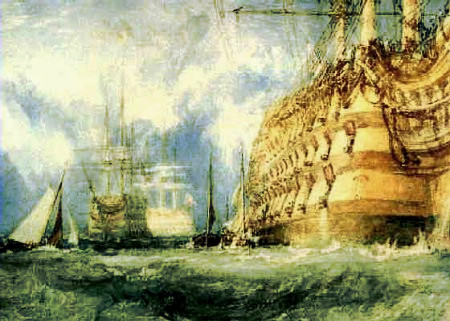
October 21st 2005 sees the 200th anniversary of Admiral Lord Nelson’s death at
the Battle of Trafalgar, and the English ruling classes are doing their damn best to make sure we all know it. Perhaps never before in the field of human conflict has so much imperial propaganda about a past battle been forced upon so many by so few. Since about June there has been 'Trafalgar this' and 'Trafalgar that' and so on and so forth. I suspect there is a lot more to come.
Who is behind this wave of hype? The Royal Navy, of course, are centrally involved but many corporations are keen to wave the flag. The list of the
sponsors of organisers 'Trafalgar 200' makes interesting reading. The arms company British Aerospace is always keen to stress exactly why it likes war. 'The Type 45 Anti-Air Warfare Destroyers will be the most advanced fighting ships of their kind in the world and BAE Systems is leading the team that will deliver them. BAE Systems is proud to be supporting Trafalgar 200 celebrations as a silver sponsor. Side by side with the Royal Navy - yesterday, today and tomorrow.'
Conservative commentators can hardly contain their excitement about the whole affair. Historian
Andrew Roberts, who is updating Winston Churchill's 'History of the English-Speaking Peoples', writes about the commemoration of Trafalgar in the latest issue of Right wing journal
The New Criterion.
'...what celebrations there shall be! Her Majesty the Queen and Prince Philip will be dining with all the surviving First Sea Lords of her reign in the captain’s cabin of HMS Victory on Trafalgar Day itself, Friday, October 21, the same evening that literally hundreds of dinners, great and small, will be taking place up and down the country to toast the Immortal Memory of the greatest military hero of our long island history. That night there will hardly be a sober breath drawn by any Briton who has any patriotism in his soul, let alone any seafaring connections. Rum will be drunk by those who otherwise rarely touch the stuff.' Prince Phillip (of Greece and Denmark) - well there is a man 'with patriotism in his soul' - though I doubt he can really be called a 'Briton'. Anyway, it is undeniable that many members of the English upper classes are indeed rolling out the barrel for the occasion. Here is Roberts again:
'...the auction industry has cashed in successfully on the bicentenary. Descendants of Trafalgar survivors, especially those of Nelson’s captains, have been waiting, in some cases for years, for this opportunity to sell off their Nelsonia. The results have been spectacular. In Edinburgh, a letter from Nelson referring to his perfect recovery after losing his right arm fetched £42,000, ten times its estimate. At Bonhams auction in London, in July, the lots fetched a total of £1.8 million, achieving five world-record prices. A cased Lloyd’s Patriotic Fund Trafalgar Sword that had been awarded to Charles Tyler, captain of HMS Tonnant, fetched £179,200, and the Naval Gold Medal awarded to Captain Eliab Harvey of HMS Temeraire fetched £95,200. A silver meat dish and a silver plate from Nelson’s dinner service at the Nile campaign fetched £60,000 and £26,400, respectively.'Currently
online, I have spotted a large chunk of wood - 'Oak & Copper Salvaged from HMS Victory' - going for a snip at £20,000.
The organisers, Trafalgar 200, despite their pretence at organising a truly 'national' celebration, is catering essentially for this layer of ridiculously rich people (and their hangers on who also have more money than sense). They are offering
a unique opportunity - 'a private dinner for 22 in the Great Cabin of HMS VICTORY. The evening will be hosted by the Second Sea Lord but you can choose the menu as well as the format of the evening, music will be provided by the Royal Marines. A commemorative piece of Silver and a copy of the VIP version of the international Fleet Review Souvenir Brochure will also given to all your guests.'
The cost of this 'opportunity'? A mere £25,000.
I know what you are thinking - it is a bit more expensive than a meal out at Pizza Express. But remember - you get to spend the evening with the Second Sea Lord,
Vice Admiral Sir James Burnell-Nugent KCB CBE ADC. Who could resist such sparkling conversation with a man who 'commanded the conventional submarine HMS Olympus 1979-80 and the nuclear powered submarine HMS Conqueror 1984-86, carrying out many Cold War patrols. In command of the frigate HMS Brilliant 1992-93, he was involved in the early stages of the Bosnia Crisis. He was in command of the aircraft carrier HMS Invincible when she made two joint operational deployments to the Gulf for air operations over Iraq and then conducted further air operations during the Kosovo Crisis. As Commander UK Maritime Forces 2001-02, he was Maritime Commander of the UK Joint Force and the Deputy Maritime Commander of the Coalition for the first 6 months of the “War on Terror” – a force of 40,000 men and women in 104 ships.'
We can pick up some hints about the likely topics of discussion at such gatherings from Andrew Roberts, who has doubtless already booked his meal with Sir James 'Blunt' Burnell-Nugent.
'The many celebrations of the bicentenary of Admiral Lord Nelson’s death at the battle of Trafalgar on October 21, 1805 tell us much about how Britons view themselves in the early twenty-first century...Yet there is a tangible sense of atavism, yearning, and perhaps even sorrow about the anniversary, for the way it italicizes the contrast between Britain’s former naval greatness and national heroism and her present unprecedented maritime weakness...with the fleet being reduced from thirty-one frigates and destroyers to a mere twenty-five by New Labour, Britain is at her weakest in terms of relative sea power than at any time since the reign of Henry VIII, the monarch who built the modern Royal Navy...' Yeah, Blair's regime are such a bunch of hippy pacifists aren't they?
Roberts detests those who try 'to decry all this veneration of Nelson and Trafalgar' and 'introduce such jarring notes into the festivities'. In June, an article in
The Times by the historian Ben Macintyre noted that Nelson was guilty of a war crime in hanging ninety-nine Neapolitan rebels in 1799, after they had been given safe passage. Roberts calls this a 'substantial criticism' - but still clearly worships Nelson. As he notes, 'we are celebrating the moment when Britons knew for sure that the country was safe from invasion and subjugation by a murderous and tyrannical foreign empire: thus, festivities are wholly in order.'
Why then will I not be celebrating the Battle of Trafalgar? Surely Nelson is one of England's greatest heroes - and a hero of humanity as a whole? Why try to cast around for a tar of pit to spoil a barrel of honey? I suppose I find the hypocrisy of the whole spectacle just too overwhelming.
Firstly - lets look at the battle of Trafalgar. No, not the one in 1805 but the one fought near there on July 18, 711AD, when a Muslim army led by General Tariq defeated the superior forces of King Roderick near Cape Trafalgar, on the south of Spain. The name Trafalgar is from the Arabic taraf al-Ghar. Taraf means cape and ghar, as in Ghar-i-Hira, is cave. Hence, it means “Cape of the Cave”. An excellent little article
here examines how British rulers see Arabs as 'the other' to be despised, yet swell with puffed up pride at the mention of
Taraf al-Ghar.
Secondly, when Roberts asks us to imagine the French under Napoleon as 'a murderous and tyrannical empire' we can agree. However, forgotten amid all the self-congratulation is the awkward fact that the English were also a 'murderous and tyrannical empire'.
In 1805, slavery was still in full flow and the English and French were colonial rivals, fighting between themselves for, among other things, control of sugar rich colonies out in the West Indies. The story of this obscenity and how it was ended has been well set out by among others CLR James, Robin Blackburn and David Geggus, but I am going to quote from Paul Foot's
eloquent summary of the story. Paul Foot gives us some idea of what the British were up to just ten years just before the Battle of Trafalgar:
A British expedition of 6,000 men, which was to grow into the greatest expedition ever to have left British shores, arrived, spoiling for a fight, in St Domingue. The British Prime Minister Pitt was on the record, as we have seen, against slavery. One reason was that the most profitable fruits of slavery – in St Domingue – were flowing only to France. Now Pitt and his class were looking at a different picture. There was a chance that the French might be dislodged from the island by a slave revolt; and that the British might seize St Domingue, restore slavery there and make good British profits from it.
The British war against Toussaint’s armies in St Domingue lasted four years – from 1794 to 1798. During this period the Abolition of Slavery Movement in Britain almost petered out. There were two more desultory attempts to get a bill through the Commons – in 1795 and 1796. In the three years after 1795 the Abolition Society met twice. From 1797 to 1804 it did not meet at all. During the eight years after 1792, moreover, a million slaves were carried from Africa to the ‘new world’ in British ships.'The British did not reckon for the slaves on San Domingue, who organised themselves militarily into a fighting force that defeated the British and expelled them from their island. Seeing the British defeated, the French, that 'murderous and tyrannical empire' remember, decided to try and conquer San Domingue for itself. What was the reaction of the British to this? Here is Paul Foot again describing the Peace of Amiens between England and France in 1802:
'The British, united with their enemy Napoleon in their determination to put down the slave revolt, obliged with a short peace so that Napoleon could devote his full attention to Toussaint L’Ouverture. In charge of his huge expedition Napoleon appointed his son in law, Le Clerc, who predicted, ‘all the niggers when they see an army will lay down their arms.’The story of the
Haitian Revolution reveals the hypocrisy at the heart of those trying to glory in the Battle of Trafalgar. The Battle of Trafalgar was about dictatorial colonial power and which dictatorial colonial power would have naval supremacy. It was not about liberty or freedom in any sense of the word. Here Churchill may have understood something about the Battle of Trafalgar that his successor Andrew Roberts is unable to - when he noted 'Don't talk to me about naval tradition. It's nothing but rum, sodomy and the lash'.
For socialists, our response to our rulers celebration of the Battle of Trafalgar should arguably be to recall the Haitian Revolution which defeated not just the tyrannical French and Spanish empires but also the murderous British empire as well. If we want to hear the sound of liberty ringing down through the centuries, let us listen to Toussaint L'Ouverture, leader of the Haitian Revolution and a military genius at least the equal of Nelson. This is
him in 1795, calling on all free slaves to resist the English trying to reimpose slavery on them all:
'The irons of the despot of England are not made for you...like all republicans, I am animated by the ardent desire to find only brothers and friends wherever I march the troops confided to my command. Humanity is one of the sacred obligations that will make us surpass all the other peoples. Saving brothers from their straying and lending them a helping hand also enters into our principles...In keeping with these words from the heart, I call upon you, in the name of the Republic, to rally to me within the hour.'Instead of English school kids being force-fed the story of the Battle of Trafalgar this month, (in the hope that by teaching more British imperial history they will become more patriotic), let them instead read William Wordworth's 1802 tribute to Toussaint L'Ouverture, then languishing in a French prison.
TOUSSAINT, the most unhappy man of men!
Whether the whistling Rustic tend his plough
Within thy hearing, or thy head be now
Pillowed in some deep dungeon's earless den;
O miserable Chieftain! where and when
Wilt thou find patience? Yet die not; do thou
Wear rather in thy bonds a cheerful brow:
Though fallen thyself, never to rise again,
Live, and take comfort. Thou hast left behind
Powers that will work for thee; air, earth, and skies;
There's not a breathing of the common wind
That will forget thee; thou hast great allies;
Thy friends are exultations, agonies,
And love, and man's unconquerable mind.Edit: to add
a recent article by Jonathan Neale on the Battle of TrafalgarLabels: Britishness, empire, history













